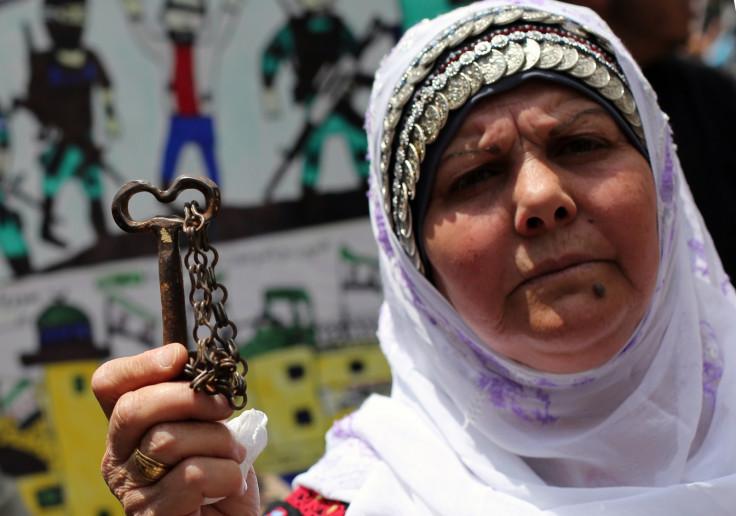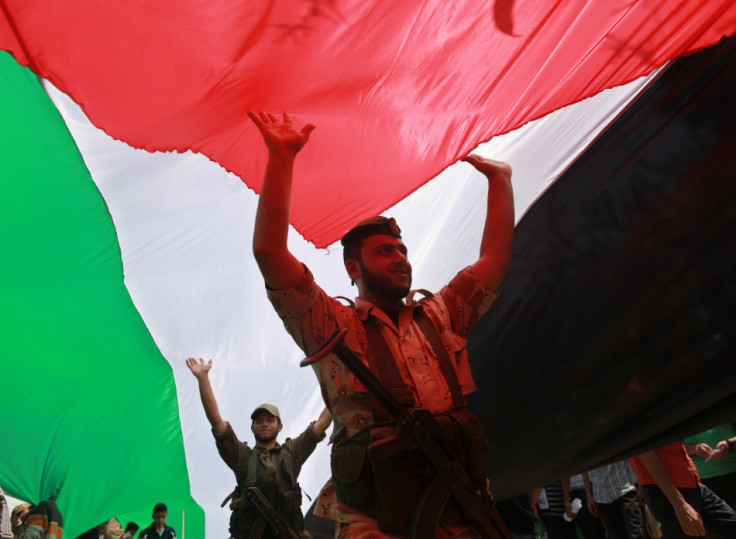Nakba: Mutilating the memory of Palestinian exile

On 15 May, after Friday prayers, the sound of sirens from mosques reverberate across Ramallah to mark the displacement of Palestinians by Israeli Zionist forces in 1948, an event that Palestinians know as the Nakba, or the "catastrophe."
Nakba, at the core of the Palestinian cause, anchors an incessantly mutilated Palestinian identity. Palestinians commemorate their grandparents' forced exile, defying the infamous statement by Israel's founder, David Ben Gurion: "The old will die and the young will forget."
Palestinians have not forgotten.
Al-Manara Square, at the heart of downtown Ramallah, is adorned with large flags and posters. In bold Arabic letters, they vow to the Palestinian people to remain tenacious toward the right of return, stating: "Through struggle and unity we will return." Below reads an invitation to a festival promising a performance by Palestinian singer Mohammad Assaf.
In Ramallah, 15 May impels the transformation of the city into a charlatan parade with an overwhelming kaleidoscope of banners and flags. The celebration of our 68<sup>th anniversary of perpetuated oppression seems more fatuous every year. It is these very festivities which should force a closer look at the rhetoric propagated by the Palestinian Authority (PA).
The PA may be content to mark the Nakba with vacuous celebrations, but the rest of Palestinian society wants something else – liberation, and the right to return in line with UN Resolution 194.
The events and decorations of Nakba commemoration in the West Bank are funded by the Department of Refugee Affairs, a special committee within the PA. The very formation of a specific organization to hold such events epitomizes the monopolization of the Palestinian tragedy by the PA. What once was a revolutionary effort has been reduced to an instrument assuring the mollification of the Palestinian public.
The PA is struggling to maintain its position as the representative of the Palestinian people.
In the Zionist narrative, Palestine was a "land without a people for a people without a land." The fact that Palestinian civil society has managed to etch the narrative of the Nakba into the discourse of the Palestinian question is a milestone. It ensures that the memory of collective loss and destruction remains unforgotten. However, this was not achieved with ease. Palestinians have and continue to deal with the consequences of defying the accepted Israeli narrative both locally and abroad. The mitigation of Nakba commemoration betrays these very efforts.
As Abdelraziq Hamarsheh, 30, an electrical engineer from Jenin, explained: "The embellishments of these iconic symbols, keep increasing every year. Damn it, [the PA] have reduced everything to slogans. The more the symbols increase the more our attempts to return decrease – that is what we are being reduced to, hollow symbols."
Being the headquarters of the PA, Ramallah farcically acts as though it is a liberated entity. By deluding the reality of being under occupation, the city parallels its inane symbols. The festivities surrounding the Nakba are merely a reflection of this Kafkaesque environment.

Let's not forget that while the revelries took place on 15 May, dozens of Palestinian youths gathered near Ramallah to protest the illegal settlement of Beit El. It was an act by youth to pay tribute to the Nakba and resistance. But before reaching their destination they were met with aggression by Palestinian police, who redirected their route back to the city centre where preparations for the annual parade were ongoing.
It is important to note the sensitive nature on the ground where more Palestinians are publicly speaking out against the PA and the fact that earlier in the year with the spark of the "third intifada" youth claimed to take matters into their hands, further exposing the failure of the PA.
The PA is thus struggling to maintain its position as the representative of the Palestinian people. Flamboyant posters reading "the camps are only temporary, we will return" are a ploy to feign that the PA's goals and aspirations are still intertwined with those of the Palestinian people. A re-assurance that the cause is neither pawned nor forgotten.
Our ruling authority is using our collective nostalgia as an instrument to perpetuate a stagnant state of waiting in sombre ululations.
While Ramallah is inundated with hollow vows that the "camps are temporary," al-Amari refugee camp, just ten minutes away from the city centre, home to more than 10,000 Palestinian refugees, exposes a different context.
Umm Abedallah, a 76-year-old mother of eight, sits on the balcony of her two-bedroom home. As a refugee from al-Lydd – which in Israel is known as Lod – I probed her to recollect moments of the Nakba. She bursts out laughing: "Look around you. You're living the Nakba, it merely started with us."
The simplification of the Palestinian collective memory into banners with symbolic promises strips the narrative of its tragic element. What occurred in 1948 persists today and is in its core catastrophic, a reality that is obscured amid the loud music and flamboyant decorations.
I ask Umm Abedallah if she still has hope to return, she quietly goes inside her home and returns holding a rusting key: "I'm sick of holding this key. They've been telling us to wait since the first family left. To wait for the Arab armies to liberate us. To wait for the freedom fighters. To wait for the negotiations. We don't want to wait anymore."
Taking a deep breath, she adds: "With all the waiting the smell of my home in al-Lydd seems more distant every day."
While the Nakba continues to be canonized in the form of iconic symbols and jamboree, what is essentially occurring is the hijacking of revolutionary substance in the name of commemoration. Our ruling authority is using our collective nostalgia as an instrument to perpetuate a stagnant state of waiting in sombre ululations.
Just a week after the festivities, Israel continues to demolish Palestinian homes and displace Palestinian families, while the Palestinian Authority begins to take down the commemorative posters – until next year.
Mariam Barghouti is a Palestinian writer, blogger and activist from Ramallah. Follow her on Twitter: @MariamBarghouti
© Copyright IBTimes 2025. All rights reserved.






















